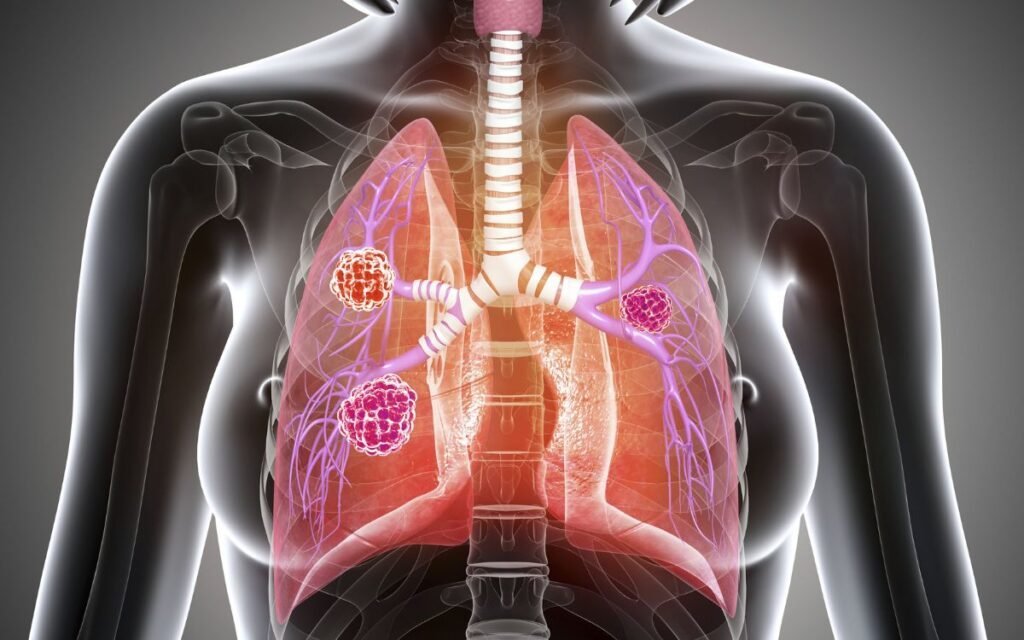ESMO 2023: Abstract ID 1261O
Treating early-stage NSCLC presents numerous obstacles, given the restricted therapeutic alternatives available. In this landscape, the combination of OPDIVO and chemotherapy emerges as a sanctioned neoadjuvant treatment in the United States and various other nations, targeting adult patients with operable NSCLC, specifically those with tumors exceeding 4 cm or with node involvement. This approval extends to the European market for individuals at an elevated risk of relapse, exhibiting over 1% PD-L1 tumor expression.
Within this context, the CheckMate-816 study, a Phase III, multicenter, open-label trial, was initiated to scrutinize the impact of integrating nivolumab with standard chemotherapy, challenging the sole use of chemotherapy in the preparatory phase of surgical treatment in early-stage, resectable IB to IIIA NSCLC patients. This inclusive study involved a diverse patient group, irrespective of their PD-L1 status. In total, 358 participants were strategically assigned to undergo a regimen of either 360 mg of nivolumab alongside a histology-tailored platinum doublet chemotherapy for a trio of triweekly cycles or a matching sequence of exclusive chemotherapy, preceding surgical intervention.
Remarkably, outcomes from CheckMate-816 pointed to a triumph on both primary fronts. The incorporation of nivolumab with chemotherapy prior to surgery marked a statistically and clinically consequential advancement in the landscape of NSCLC treatment, showcasing pronounced enhancements in both Event-Free Survival (EFS) and Pathological Complete Response (PCR) when juxtaposed with the chemotherapy-alone protocol for patients harboring resectable forms of NSCLC.
During the simultaneous randomization in the CheckMate-816 trial, patients were evenly distributed across the nivolumab plus ipilimumab and exclusive chemotherapy protocols, ensuring uniform baseline characteristics among the participants. Insights shared at the ESMO 2023 conference, reflecting data up to October 2022, highlighted a median follow-up period of 49.2 months. This long-term observation revealed a distinct advantage in both Event-Free Survival (EFS) and Overall Survival (OS) for those receiving the combined immunotherapy treatment compared to standard chemotherapy.
Specifically, the median EFS dramatically diverged at 54.8 months for the nivolumab plus ipilimumab group, starkly contrasting with just 20.9 months for those under chemotherapy. The median OS remained undetermined for both groups, indicating ongoing survival benefits. Interestingly, surgical intervention was pursued for a comparable majority in both cohorts, with 74% in the combined immunotherapy group and 76% in the chemotherapy group.
Another pivotal discovery was the correlation between the initial 4-gene inflammatory score and patient outcomes. Participants with a higher score exhibited improved EFS and a better probability of achieving a pathologic complete response (pCR) with the nivolumab plus ipilimumab treatment. Regarding safety, the incidence of severe (grade 3-4) side effects related to treatment appeared lower in the immunotherapy combination arm at 14% compared to 36% in the chemotherapy arm. Similarly, serious surgery-related adverse events were almost equivalent between the groups, recorded at 15% for the nivolumab plus ipilimumab recipients and 14% for those receiving chemotherapy.
Also Read: How Keytruda Improved Survival Outcomes For Early-Stage TNBC Patients: KEYNOTE-522 Trial
In Conclusion
An in-depth analysis of the CheckMate 816 trial underscores the promise of nivolumab plus ipilimumab as an influential neoadjuvant strategy for patients with operable non-small cell lung cancer (NSCLC). This approach significantly outperformed conventional chemotherapy, achieving superior rates in both pathologic complete response (PCR) and major pathologic response (MPR). Moreover, the dual immunotherapy regimen showed encouraging progress in event-free survival (EFS) and overall survival (OS) after one year.
The study further suggests that patients with pronounced baseline tumor inflammation, determined by a 4-gene inflammatory signature, could experience heightened EFS and PCR success when treated with nivolumab plus ipilimumab. Critically, this therapeutic combination preserved an acceptable safety landscape and upheld surgical rates on par with those of chemotherapy. Nonetheless, it’s crucial to recognize that the pairing of nivolumab with chemotherapy continues to be the benchmark neoadjuvant therapy in this patient population.
In a rapidly evolving landscape, OPDIVO’s monopoly as the exclusive neoadjuvant option for early-stage NSCLC, established in March 2022, was quickly overshadowed. By October 2023, KEYTRUDA broke new ground, becoming the inaugural PD-1 inhibitor approved for comprehensive perioperative use in treatable NSCLC, casting doubt on OPDIVO’s commercial trajectory. While AstraZeneca’s IMFINZI shows potential following optimistic EFS data from the perioperative AEGEAN study, its clinical impact hinges on future regulatory endorsements. Concurrently, Roche’s TECENTRIQ faces unforeseen holdups within its IMpower-030 study, projecting key findings to surface only in 2024.





























